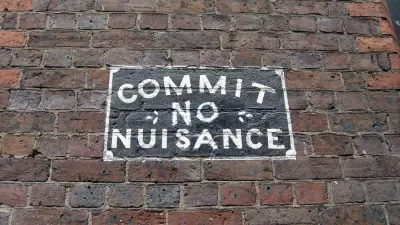David Alpert provides a thorough analysis of the first third of Washington D.C.'s proposed new zoning code, and finds a return to kind of development patterns that formed the neighborhoods residents treasure today.
According to Alpert, the Washington D.C. Office of Planning has been working to rewrite the city's archaic 1958 zoning code for four years. Now a portion of the proposed code is making its way through the public process.
The new code aims to, "correct some of the most egregious problems from the 1958 code, where it imposed social engineering ideas in vogue at the time that ended up eliminating local corner stores, pushed people out of urban neighborhoods, and forced new buildings to take a suburban form incompatible with the walkable communities that previously existed."
Alpert finds that in looking forward, the new code largely looks to traditional development patterns for major revisions such as reducing parking requirements, allowing accessory units, reducing restrictions on retail in residential areas, and easing restrictions on alley dwellings. One progressive change that Alpert highlights is a new "Green Area Ratio" for large buildings.
FULL STORY: Rewritten DC zoning code corrects past mistakes

Planetizen Federal Action Tracker
A weekly monitor of how Trump’s orders and actions are impacting planners and planning in America.

Maui's Vacation Rental Debate Turns Ugly
Verbal attacks, misinformation campaigns and fistfights plague a high-stakes debate to convert thousands of vacation rentals into long-term housing.

Restaurant Patios Were a Pandemic Win — Why Were They so Hard to Keep?
Social distancing requirements and changes in travel patterns prompted cities to pilot new uses for street and sidewalk space. Then it got complicated.

In California Battle of Housing vs. Environment, Housing Just Won
A new state law significantly limits the power of CEQA, an environmental review law that served as a powerful tool for blocking new development.

Boulder Eliminates Parking Minimums Citywide
Officials estimate the cost of building a single underground parking space at up to $100,000.

Orange County, Florida Adopts Largest US “Sprawl Repair” Code
The ‘Orange Code’ seeks to rectify decades of sprawl-inducing, car-oriented development.
Urban Design for Planners 1: Software Tools
This six-course series explores essential urban design concepts using open source software and equips planners with the tools they need to participate fully in the urban design process.
Planning for Universal Design
Learn the tools for implementing Universal Design in planning regulations.
Heyer Gruel & Associates PA
JM Goldson LLC
Custer County Colorado
City of Camden Redevelopment Agency
City of Astoria
Transportation Research & Education Center (TREC) at Portland State University
Jefferson Parish Government
Camden Redevelopment Agency
City of Claremont



























